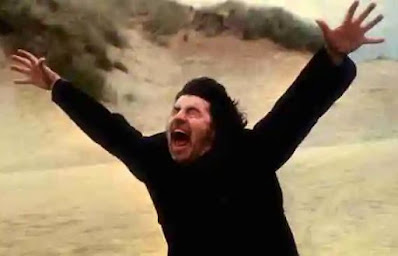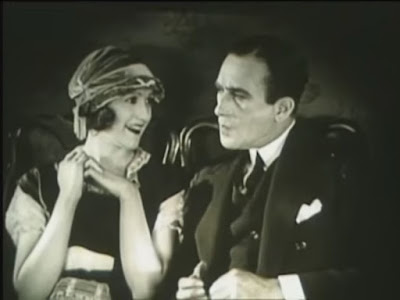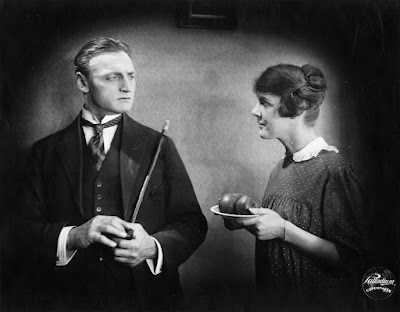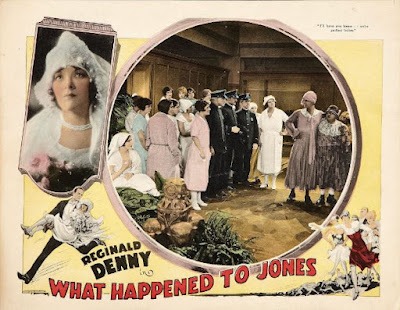This was an extraordinary evening in the presence of a
remarkable man who probably needed an all-nighter to get through all of his
amazing stories from a life encompassing boxing, drumming, poetry, directing,
acting, writing, painting and then back to film. His last film, EO (2022)
was Oscar nominated and is out on BFI Blu-ray on 3rd April, his next
film is due later this year written for some guy he met through a mutual
appreciation of jazz – then illegal – back in Iron Curtain Poland in 1956,
Roman Polanski.
Born in 1936 or probably 1938, Skolimowski explained that
his mother had had to change his birthdate so that he would qualify for support
post-war. During the war he was trained to play act as a happy child, jumping
up and down on his bed when the Gestapo made a call, hiding the fact that there
was a printing press underneath it, used by his parents to spread the news of
what was actually happening. His father was executed by the Germans and after
the war, in recognition of his parents’ activism, he was sent to a special
school in Prague were his dorm included future filmmakers Miloš Forman and Ivan
Passer, whilst future Czech President Václav Havel, was also there.
Jerzy wanted to make his mark and this began with
attempts at being a poet – he joked (perhaps) of visiting libraries to steal
his books so that no one could read how bad they were – jazz drumming, he
couldn’t really keep time, and amateur boxing which taught him to keep his eyes
open during every blow so that he knew how to recover and take evasive action.
Lessons in life. When his chance came with film, he grasped it with the same
alertness and co-ordinated aggression, writing scripts and then planning out a
full feature film based on his four student projects in film school.
 |
| Michael Brook, Jerzy Skolimowski and his partner/co-writer Ewa Piaskowska |
His films in Poland – and Belgium – during the sixties
established his name and then he went too far into politics for the authorities
to bear, a four-eyed Stalin in Hands Up!, being enough to ensure they
delivered his passport as the biggest hint to leave. He came to the UK, where
he knew no one, and made the sublime Deep End (1970) with Jane Asher and John
Moulder Brown. The dialogue was partly improvised and it was the smartly
experienced Asher who came up with the “de-facing Government property” line
when she rips up a poster promoting contraception.
By now time was running short and we didn’t get much further than Moonlighting (1982) the making of which is as fascinating as the film itself and says much about the director's generosity and determination. Essentially in 1981 when Poland was put under martial law, Jerzy came across a crowd of Poles outside a hotel where he lived who were now without a country to return to, he took them in and found a place for every one through friends and looking up Poles in the phone book; just head to the sectionwith names starting "Sz..." Then, he decides to make a film about his country's hour of need, persuades Channel 4 to back it, Jeremy Irons to star in it and theatre impressario Michael White to also fund it through a mid-tennis match sales pitch. Another extraordinary circumstance and the resultant film is one of those I'm most looking forward to seeing on the big screen.
Props to film writer Michael Brook for digging into this rich history and we literally could have gone on well into the next day had scheduling not intervened for Jerzy's uncanny masterpiece, The Shout (1978), was due to screen and he had to prepare himself for his introduction. Before he spoke though there was a unique introduction from Mark Jenkin who had taken the extraordinary step of a Cornishman, to cross the border into Devon, to seek out the locations of The Shout in ways that only he can. Is the soul of the story to be found in the spaces between the locations, Saunton Sands, the church of St Peter in Westleigh and Braunton Burrows, or in the stone and the land itself, echoing the themes of the film itself?
 |
| Alan Bates |
The director described this film as his happiest experience
in filmmaking and that it was mostly down to his producer Jeremy Thomas, well
that and the 200 Thai Sticks they were going to quote as a dedication at the
end of the film! The film is indeed one wild trip but that’s more down to the
story and setting as well as the performances from a remarkable cast to which
he credits Thomas’ powers of persuasion. For himself, Jeremy is equally
impressed with his director: “Skolimowski had a sense of shooting style
then, this was the second director who I had worked closely with, and it was
fascinating watching Skolimowski work. He came from a Polish tradition, the
Wajda Film School, he had a different background to other directors… And it
made the film much more creative to me. I saw it more as an artistic endeavour
by him.”
The film features electronica from Rupert Hine who
started out as a fold musician but ended up Chair of the Ivor Novello Awards having
had hits of his own as well as producing everyone from Tina Turner to Rush and
Underworld. The composers of the main theme and incidental music were Tony
Banks and Mike Rutherford of the progressive rock combo, Genesis*, then extremely
out of fashion but about to conquer the world with the aid of drummer Phil
Collins.
Rutherford and Banks went to Charterhouse as did,
coincidentally, Robert Graves whose story provides the basis of the film, a mysterious
tale of a man who claims to have supernatural powers that is told largely in flashback
during a cricket match played at a mental hospital. Jerzy was very keen to film
a cricket match but this is unlike any you’ll have seen – of course – and I’m
still having nightmares about a nearly naked Jim Broadbent running around in
only his cricketer’s box and covering himself with cow dung. Jim worked with
Ken Campbell early doors, what can one say?
The film’s flashback begins after Susannah York rushes to
a remote hospital after an incident, crying “where is he?” before entering the
billiard room in which three dead bodies are laid out under clothe. We don’t quite
catch the faces before the scene changes to the pastoral calm of a cricket
match as a young Robert Graves (Tim Curry) arrives in his whites. He meets the
head Doctor (Robert Stephens) who introduces him to a man known as Crossley
(Alan Bates), whom he describes as the most intelligent man in the place.
Crossley and Graves are set to score the match and as
they watch it unfold from the edge of the pitch, the former begins to tell his
strange tale involving his involvement with a couple who, he considers, have
lost their way in their marriage. Anthony Fielding (John Hurt) is an experimental
composer working away in his home studio supported by his wife Rachel (Susannah
York). Whilst we have already seen Susannah, John Hurt is one of those out on
the cricket pitch… we assume now that they’re the same characters and, they
might well be.
In Crossley’s story, we see him engineer a meeting with
Anthony after he has been playing the local church organ and had a secret
assignation with a young married woman (Carol Drinkwater), he starts talking to
Anthony about his faith and ends up following him home and inviting himself to
lunch and to stay. Gradually he reveals his strangeness and his past decades
spent in the Australian outback during which, in addiction to apparently
killing any offspring as his right under their supposed rules, he learned much
magic including the ability to kill men with his voice, The Shout or The Scream.
 |
| John Hurt, Alan Bates and Susannah York, a talented table |
He pushes both of the couple’s sensibilities and the
viewer is left wondering what is real and what is simple fantasy but there are
so many layers as events unfold.
The cast is, of course fabulous, but its Bates who
dominates with his thousand-yard stare and a restless power that continually
wrongfoots expectation and social norms unsettling both those o and off screen.
It’s a very centred performance that conceals as much as it reveals and only
generates more mystery as the story is fully revealed.
The film was nominated for the Palme d'Or at the 1978
Cannes Film Festival and received the Grand Prize of the Jury, in a tie with
Bye Bye Monkey.
The Jerzy Skolimowski Season continues into April andthere are full details on the BFI site.
The BFI are also releasing the Oscar nominated EO
(2022) as well as a double set, Identification Marks (1964) the film he
made over four years at film school and Hands Up! (1967) the film that
got him exiled from Poland, on 24th April.









_-_Ad.jpg)

.jpg)
.jpg)
%20combined%20age%2036.JPG)
%20suitor.JPG)




%20theatre%20look%201.jpg)
.jpg)


%202.jpg)
.jpg)

%20bath%20towel%207.jpg)
.jpg)






%20blue%20steel%202.png)
.png)
%20reviewing%20the%20options.png)
%20blue.png)
.png)
%202.png)
%20baby.png)
%20baby%202.png)
%20mirror.png)
.png)
.png)










